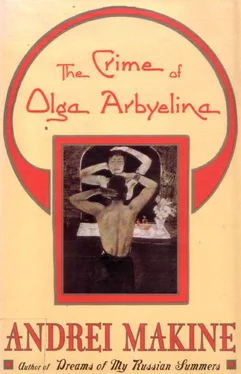Then there were the readers whom Olga privately called "the climbers." These were the ones who had managed to leave their much-maligned quarters in the old brewery and had moved into the upper part of Villiers-la-Forêt while dreaming, secretly or openly, of one day going to live in Paris.
Masha came as well and, leaning on the display shelves, she murmured confidentially, "I won't be coming again for a couple of weeks now. I'm off to Nice. With him…"
The significance of "with him" was already clear to Olga: not with the husband.
Into this intermittent sequence of conversationalists slipped the former pharmacist who lived in forced idleness following the destruction of his premises by Allied bombers. Since that catastrophe he had drawn closer to the émigré community in the lower town, had even begun to learn their language and had gradually assumed the role of the Frenchman par excellence that every Frenchman adopts when living among foreigners. Unconsciously perhaps, he exaggerated certain characteristics that are considered to be typically Gallic and was delighted if the inhabitants of the Caravanserai exclaimed, in response to his racy puns or his gallantry, "Oh, these French-they're incorrigible!"
When he had left, Olga said to herself with a smile, "Whatever they may say about him, he was the only one to notice that I'd cut my hair." And she went over the pharmacist's words in her mind: "Oh Madame! What a blow you strike at our hearts. Quel coup! 'Cou,' of course, without the final 'p.' The curve of your neck is exquisite. I hope this is not the last of your treasures you will lay bare for us to see…" She went to put away the books the pharmacist had returned and, recalling the man's gestures and performance, thought, "You know, they really are incorrigible, these Frenchmen."
The tall, peevish nurse who was constantly in mourning came at the end of the morning and asked for a recently published book in which, she said, there should be maps that would enable her to establish the exact location of her British beloved's final air battle…
Olga did not notice the day passing. Or rather it passed in the stories of all the readers, drowning her in their words. "They've driven me out of my own life," she said to herself bitterly.
Only at the end of the day, after closing time, did she feel she was returning into her own life. Generally she left at eight o'clock sharp, otherwise the library turned into a debating chamber: and the readers, particularly those who lived in the Caravanserai building itself, would only leave at midnight, after drinking several cups of tea, reliving all the revolutions and all the wars in the world and telling the stories of their lives for the umpteenth time… That evening she locked the door and remained sitting there for a while behind the display shelves where the returned books were piled up. The faces of the day still hovered like ghosts in the half-light of the empty room. She saw herself just as all these visitors must see her: a librarian for life, a woman abandoned by her husband who had cut herself off from her own caste, the mother of a doomed child…
A slight rattling interrupted this silent colloquy. She looked up. The handle of the door was slowly turning down. For no reason the slowness of this movement was alarming. A hand shook the door several times with the same strong, sure force. After a moment of silence, a man's voice, not speaking to anyone and yet not excluding the possibility that someone might have locked themselves into the library, almost hummed, "And the bird has flown! Forgetting to switch off the light. Strange…" And a moment later the same voice was replying to a tardy reader, "Too late, my dear! Madame Arbyelina is punctuality itself. It is a quarter past eight. Punctuality, as you know, is the politeness of kings… and of princesses…"
Olga tried to fit this or that face she knew to the voice, then abandoned the attempt. A voice she had never heard before. She took the last book to be put away, the volume that had been covering up that patch of ink on the light wood of her desk. It was unpleasant to look at because it resembled a potbellied man; she always hid it with a sheet of paper or a book. Suddenly, like a moth fluttering out of the folds of a curtain, the three snapshots slithered to the ground. Since that morning, amid the hubbub of words, she had forgotten all about them. The blood rushed to her cheeks. "Suppose a reader had taken this book out tomorrow?" She pictured the scene, the shame, the laughter, the tittle-tattle…
And when her eyes peered deeply once more into the nocturnal room where a naked woman stood beside a French door in darkness, the mystery of this moment could be approached very simply. Nobody knew the woman was there, in the middle of the night, in the coolness that arose from the river. "Just as nobody knows that I am in this empty library now, lit only by this little table lamp. I have lived a half hour of my life they will never know about." She told herself the woman in the photograph could have walked out through the French door and taken a few steps across the meadow that sloped down to the river… The freedom of it was heady. A naked woman walking on the grass, on a moonless night, no longer a librarian, nor an abandoned wife, nor a certain Princess Arbyelina…
On her way home she stopped from time to time and looked about her: the little houses of the lower town, the trees, the first stars seen through their branches.
Her most intense amazement was at discovering the very close presence of a life that could remain unknown to other people.
Two days after that strange evening hidden from the others she received a letter from L.M. (her "Parisian lover," as she knew the inmates of the Caravanserai called him). It was in such half-page letters that he used to invite her to Paris. The latest one differed from previous ones in its serious and, it appeared, mildly vexed tone. Reading between the lines there was a kind of reproach: I'm just back from Germany where I've been given a guided tour of hell and here you are in France, living your little operetta of a life. The tone also meant: yes, I know we haven't seen one another for several months but you have no right to judge me: my work as a journalist takes precedence over all the tender sentiments in the world.
That evening she drafted a reply. A letter that put an end to this long sequence of meetings that they had referred to, for a certain time at least, as "love." In the lines she set down, crossed out, rewrote, this word no longer occurred. And once this linchpin was removed, all that they had lived through became simply a collection of dates, tones of voice, hotel rooms, ends of the street, different silences in the night, pleasures of which only the shell of the memory remained. She tried to tell him all that… The rhythm of the sentences was transferred to her body and made her walk up and down mechanically in the corridor of her narrow house. In the hall her eye lingered on the old chest of drawers. The corner of the top had been sawed in an irregular curve. It was L.M. who had done that; so that the child should not cut himself when playing, he explained. He was very proud of this service rendered. "Like all men who give practical help to a single mother," she thought. Each time, as he came in, when he visited her at Villiers, he would finger the sawed-off corner, as if checking his work, and sometimes he would even ask her, "So it's doing the job? Don't hesitate to let me know if you need any other sawing done." Now, as she walked through the hall, she told herself that she should have risked the truth and mentioned that sawed-off corner in her letter-one of the real reasons for breaking with him! But would he have understood? She could just have written about that corner and nothing else. Or perhaps this scenario as well: a man with a pale torso, stretched out in the darkness beside her, talks without stopping, now spurred on by his desire, now deflated by the lack of it… The whole truth could be summed up in those two fragments.
Читать дальше












